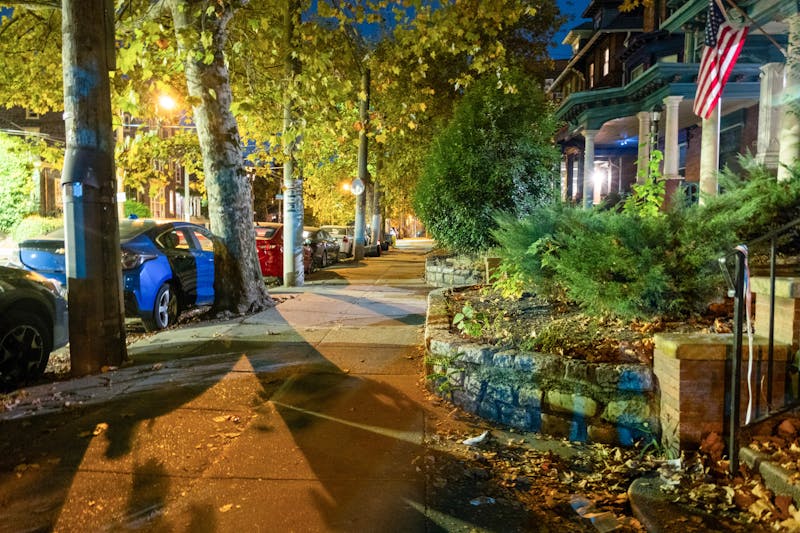Do you want Congress to institute an Academic Bill of Rights? Don't answer yet. Because like all things congressional, this bill is tricky.
The bill is currently affixed as an amendment to the House's version of the Higher Education Act, which allots financial aid, and is up for reauthorization this session. Basically, the bill states that universities should hire professors based not on politics but on merit, that students should be allowed to disagree with their professors in class without having their grades lowered and that professors should acknowledge both sides of a debate.
Sounds good, right?
It did to me, too. After all, what could be bad about guaranteed academic freedom? Sure, Penn already has an academic freedom policy, but why not shore it up with a Bill of Rights? Considering that in academia there are seven liberals for every one conservative, it seemed like a good idea to ensure protection of all opinions. No one should ever be afraid to express his views.
But that's the problem: this Bill of Rights will make professors afraid to express themselves. Why? Because it simply goes too far.
Take this passage from the bill: "Curricula and reading lists in the humanities and social sciences should reflect the uncertainty and unsettled character of all human knowledge by providing students with dissenting sources and viewpoints where appropriate."
How should a professor decide when it's appropriate to convey unsettledness? These days, people are willing to argue that even the most settled matters are not. Even evolution isn't concrete, according to the Dover, Pa., Board of Education. Did the Holocaust occur? Not according to marchers in Toledo, Ohio.
Obviously, these are extreme examples, but that's the point. In its current form, this bill could allow anyone to co-opt university curricula to advance his agenda. And don't think for a moment that a private institution like Penn would not be covered. The bill actually covers all "private universities that present themselves as bound by the canons of academic freedom." Which pretty much means every university that's ever existed.
Of course, the author of the bill wanted it to cover everyone. That's because he's on a witch hunt for naughty liberals who inject politics into the classroom.
His name is David Horowitz. He's a former Marxist, who now runs a conservative group called Students for Academic Freedom. On the group's Web site, Horowitz urges students to report liberal professors who "discriminate" against conservatives. He even provides downloadable "abuse" forms that aggrieved students can fill out, and urges his followers to share "stories and tips" about professors -- even if the students have never taken their classes.
I'm all for reporting incidents of academic impropriety, but it seems clear that this specific bill, far from simply protecting academic freedom, is part of Horowitz's larger goal to promote his conservative cause.
Yet even a bill without such political baggage would be misguided. Ultimately, it's not the government's place to tell professors what to teach or to suggest whom universities should hire.
Think about it: What kind of country would this be if the government moderated classroom conversations? If teachers had to defend to state officials the grades they handed out? If campus groups had to defend their choice of speakers (which they would, under the bill)? Perhaps in Orwellian doublespeak, academic freedom means federally regulated discourse, but not in this country. At least, not yet.
As it stands now, the bill does not include consequences for violators, but Horowitz has said it should. Plus, the Higher Education Act provides more than half of this country's financial aid to postsecondary students and institutions. So academia, dependent on Congress' cash, would not want to violate the bill anyway.
Ironically, if it were to pass, this bill would drain the government of those very same financial aid funds. Florida alone estimated that a similar bill before its legislature could cost the state $4.3 million a year in staffing and legal costs.
What's the solution to this legislative mess?
Follow Ohio. That state had a similar bill before its legislature this year until several universities formed the Inter-University Council of Ohio to monitor academic freedom so that the government wouldn't need to.
Maybe before the federal government gets carried away, we should form a national council with representatives from several campuses. If the situation is as dire as Horowitz says, such a council could hold meaningful discussions about the nature of a truly diverse education. Besides, I'd sooner trust academics than politicians.
Gabriel Oppenheim is a College freshman from Scarsdale, N.Y. Opp-Ed appears on Fridays.
The Daily Pennsylvanian is an independent, student-run newspaper. Please consider making a donation to support the coverage that shapes the University. Your generosity ensures a future of strong journalism at Penn.
DonatePlease note All comments are eligible for publication in The Daily Pennsylvanian.







